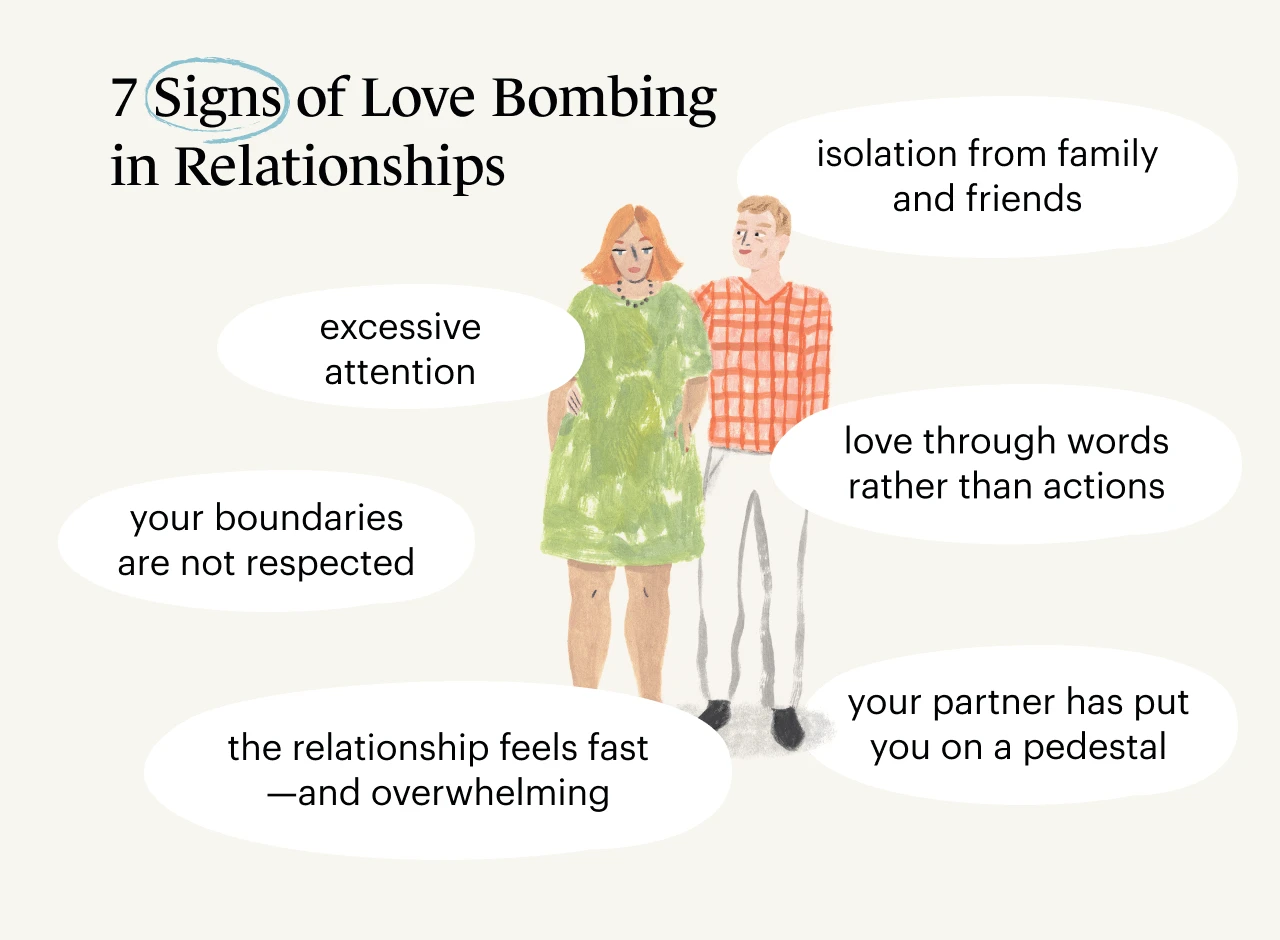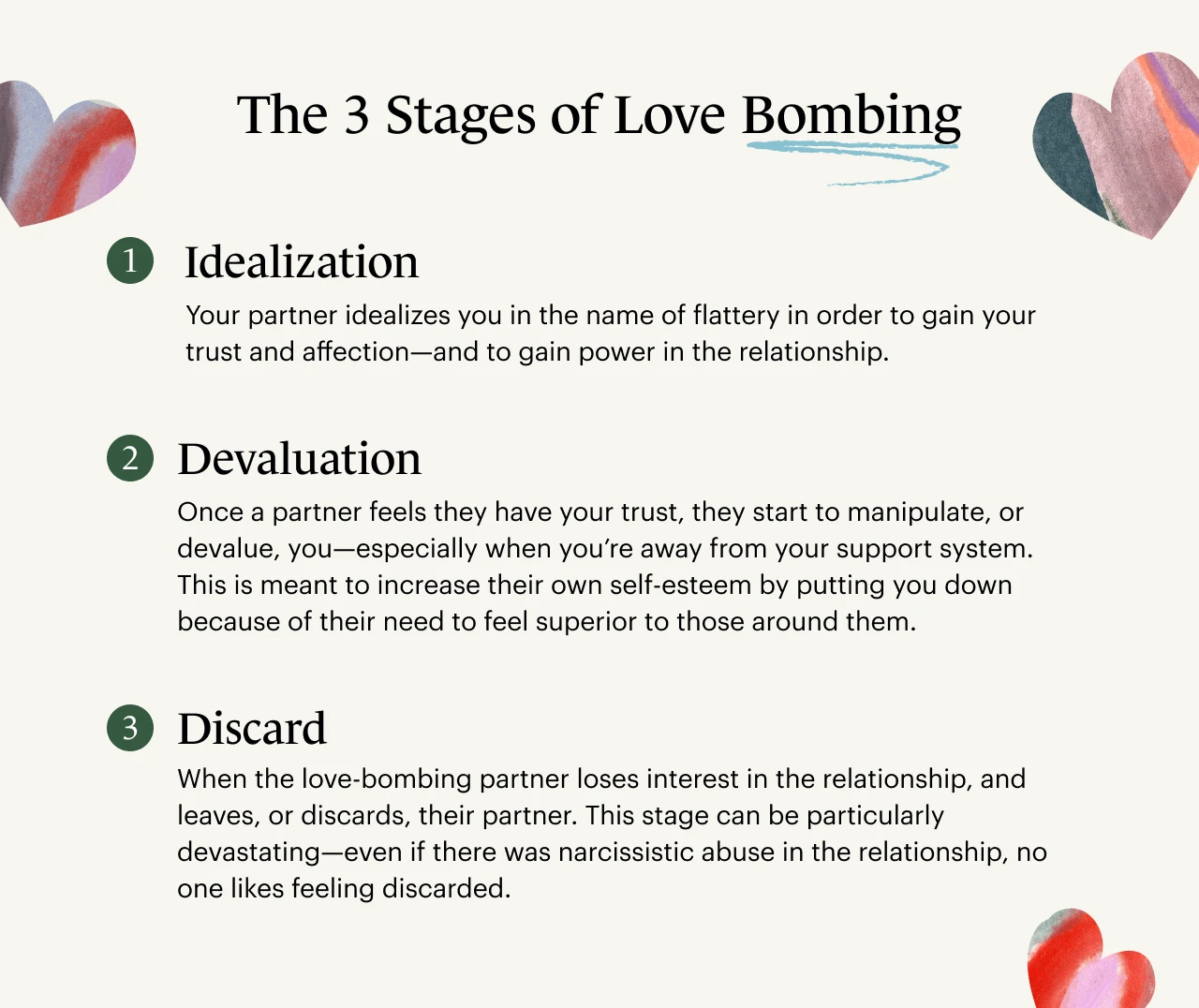Maybe you’re in the midst of a new relationship that feels too intense? Or, perhaps, your date or new partner is showering you with texts, phone calls, attention, flattery, and gifts? Does it feel a bit “off?” If so, your partner may be love bombing you.
In romantic comedies, excessive displays of affection, grand romantic gestures, extravagant gifts, and the use of terms such as soulmate are the norm, and are often characterized as “true love” between two main characters.
In real life, however, when your partner behaves this way, it can signal trouble. While this kind of over-the-top behavior can feel romantic at first, it can be part of a manipulative relationship tactic called love bombing.
Here, we’ll dive into what love bombing is, how to recognize the signs of love bombing, and what to do if it happens to you.
What is love bombing, and why is it bad?
Love bombing is the act of lavishing a partner with attention, texts, calls, gifts, or grandiose proclamations of affection, usually at the beginning of a relationship.
At first, love bombing might feel good. It can be cleverly disguised as authentic romance or partnership.
However, in reality, love bombing is a way for someone to gain power and control over their partner.
The tricky part about loving bombing is that there’s no black-and-white diagnosis.
7 signs of love bombing in relationships
The tricky part about loving bombing is that there’s no black-and-white diagnosis.
Love bombing tactics can be genuine acts of kindness between you and your date or partner, and it’s more about how you feel while on the receiving end of love bombing than the act itself.
For example, is the gift you receive from a date an appropriate, and mutual, display of affection that feels positive, rather than overwhelming?
It’s essential to pay attention to how you feel.
Here are seven signs of love bombing in relationships, and how they might manifest themselves.

1. Excessive attention
A typical sign that you’re being love bombed is that your date is showering you with excessive attention that does not match up with your level of intimacy.
“Love bombing is fast and furious,” says therapist Carol Crawley, LMFT. “That, in itself, is a red flag.”
If you’re on a first or second date, it can feel good when your date compliments or flatters you, saying something along the lines of “you are my soulmate,” or “you’re everything I’ve ever wanted in a partner.”
However, it’s important to remember that if it’s a first or second date, your partner doesn’t know you that well yet.
A helpful tactic to determine whether or not excessive attention or flattery is a love bombing tactic is to flip the compliment on its head. Is this something you would say to a partner after hanging out once or twice?
Do you feel the same as your partner feels about you?
If the gestures are grandiose and it feels overwhelming instead of mutual, it’s a sign that you’re being love bombed.
2. Isolation from family and friends
If your partner is demanding your time, attention, and approval, and gets upset with the boundaries you set or makes you feel guilty about having plans with others, they might be using love bombing tactics.
A way for your date to exert control over you, however mild it may seem at the time, is through isolating you from your family and friends. Someone using love bombing tactics is more than likely fearful of abandonment or has low self-esteem.
By isolating you from your support system, you’re left with nowhere to turn should you want to leave the relationship.
3. The relationship feels fast—and overwhelming
Saying “I love you,” meeting your partner’s parents, and suggesting that you move in with your partner are normal and healthy steps in a relationship.
However, these steps typically take time to develop naturally.
If your date is suggesting taking steps similar to these right off the bat in the name of romance, be sure to take a moment (or more) alone to assess how you really feel.
Do you feel overwhelmed, and does the relationship feel unbalanced? If so, it’s appropriate to state your needs, take time to think through decisions, and take stock in what your date is suggesting.
“If you are unsure if the speed of the relationship is healthy or unhealthy, pay attention to how your nervous system and body responds to how fast the relationship is moving towards milestones.”, says Behavioral Health Therapist Minon Maier.
“For example, ask yourself are you able to express your wants and needs? Does your partner listen to you and collaborate? Or do they continue to pressure you to do certain activities despite your needs or comfort level?”
Maier also says, “If you feel rushed, awkward, uncomfortable or pressured, these are signs that the relationship may be moving too fast for you. Your body will never lie to you about feeling safe or not safe.”
Lastly Maier stresses to pay attention to the messages your body is sending you when you are thinking about the speed of the relationship.
It’s easy to get caught up in a whirlwind relationship due to the excitement, passion, and getting showered with love but pay attention to how you feel as these qualities start to decrease in frequency.
4. Your boundaries are not respected
To the narcissist love bombing you, boundaries are alarming.
The goal of the narcissist is to gain your love, and boundary setting can be interpreted as a rejection, or that their attempt to love bomb you is failing.
Therefore, if you feel disrespected in your attempt to vocalize your discomfort with a relationship that feels fast-paced, your partner is likely a narcissist.
Regardless, keep in mind that it’s your right to set boundaries in relationships, and that in a healthy relationship, boundaries will be respected.
5. Love through words, rather than actions
The difference between love bombing and geniune love can be assessed by taking stock of your partner’s words compared to their actions, says Crawley.
People who love bomb are trying to convince you to love them, and fast.
Therefore, they’re likely to express love through words early on in the relationship–to convince you to feel the same way about them.
However, when you’re in a relationship where your partner genuinely loves you, they won’t feel a need to convince you of it. That means they’ll display love through actions because they genuinely care for you, rather than play acting love through words alone.
6. Your partner has put you on a pedestal
In your partner’s attempt to love bomb you, they’ll likely put you on a pedestal in order to convince you to love them.
While this might feel good at first, remember that in a healthy relationship, neither partner is put on a pedestal because the power dynamic is equal.
“Anyone displaying this type of manipulative behavior is not a safe person, because it’s typically very self-centered,” says Crawley
The goal of people who love bomb is to gain a partner’s trust as quickly as possible.
7. Your partner requires constant validation of your feelings for them
While it’s normal to seek validation from a partner once in a while, it’s a red flag if your partner is constantly seeking affirmation of your feelings for them.
For narcissists, this is often part of the first stage of love bombing.
The goal of people who love bomb is to gain a partner’s trust as quickly as possible.
Therefore, they’ll “love bomb” you when a relationship begins to gain your trust, and seek validation that you feel the same way back as affirmation that their love bombing is working.
“Once the narcissist believes you’re not going anywhere, that’s when the love bombing stops and devaluation stage begins,” Crawley explains.
Reasons why a partner love bombs / purpose of love bombing
A 2017 study of 484 college students established a connection between narcissism, low self-esteem, and love bombing.
People with narcissistic tendencies use love bombing as a tactic to gain control in a relationship from the start.
According to therapist and professor Suzanne Degges-White, Ph.D, “Narcissists often learn through experience that once partners see through their facades, the relationship may self-destruct.”

Stages of love bombing
Since love bombing is most commonly performed by narcissists, the stages of love bombing are similar to that of narcissistic abuse.
Stage 1: Idealization
The first stage of love bombing is idealization, where your partner idealizes you in the name of flattery in order to gain your trust and affection—and to gain power in the relationship.
Stage 2: Devaluation
Once a partner feels they have your trust, they start to manipulate, or devalue, you—especially when you’re away from your support system. This is meant to increase their own self-esteem by putting you down because of their need to feel superior to those around them.
Stage 3: Discard
As the name suggests, this stage of love bombing is when the love-bombing partner loses interest in the relationship, and leaves, or discards, their partner. This stage can be particularly devastating—even if there was narcissistic abuse in the relationship, no one likes feeling discarded.

How to make someone stop love bombing
Although there’s no way to control someone else’s behavior, there are steps you can take to establish your levels of comfort with your partner.
In any relationship, whether or not love bombing is present, thinking through desires and firmly setting boundaries is a great first step.
For example, if you only feel comfortable hanging out with your date two times a week, and they try to make you feel guilty for not wanting to spend time with them, be firm with your boundaries.
If your boundaries are disrespected by your partner, it is perfectly fine to walk away from the relationship.
Get help and relationship support
If you think you’re being love bombed, or may be in a relationship with someone who’s a narcissist, you don’t have to navigate it alone.
The Monarch Directory by SimplePractice can help you find a therapist near you who can help, including counselors and therapists who specialize in overcoming abuse in relationships that may be able to help.
Find out your relationship attachment style
Take our 3-Minute Attachment Style Quiz to find out your relationship attachment style and receive a free customized report.
Knowing your attachment style is helpful to developing a better understanding of your interactions and behavior in relationships. Results are completely confidential.
READ NEXT: Am I Dating A Narcissist?
Need to find a therapist who specializes in relationship issues? Check out the Monarch Directory by SimplePractice to view therapists and counselors near you as well as therapists who specialize in relationship issues.





